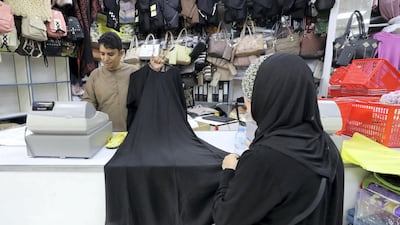My work requires me to travel a lot. Like many business people in the UAE, I conduct a number of work meetings in Dubai. Having meetings there means I get to visit of one my favourite abaya tailors in the region.
Tucked away in a quiet residential neighbourhood, my tailor has been in business for more than 30 years. Always dressed in a white kandura and a smile plastered across his face, he has held on to his traditions and way of doing business as Dubai continues to evolve over the years.
He never revamped his shop or expanded its size. His service and relationship with clients is personal. He is always in a cheery mood, asks about all my family members, providing insights on the markets and what fashion trends to expect. I receive greetings from him on the morning of the first day of Eid.
No matter how busy he might be, I always know I can count on him to make an abaya within a couple of days. Each visit is memorable and I can say that I've learnt a thing or two about advancing my business from our encounters.
I've introduced my extended family to him, who now make sure to visit his shop whenever they are in town. The catch with my tailor, or the differentiator as some might call it in the business world, is that the prices of the abayas, are for me to decide. "Pay me what you think they're worth," he says. This means I end up happily paying more for them than what he would have initially charged.
For years, I thought that my tailor was Dubai’s best-kept secret. As it turns out, he is the go-to place for acquaintances and businesswomen looking for exceptional quality at a reasonable price among a pool of designers who tend to overcharge.
One businesswoman from Bahrain was so impressed by the quality of products, craftsmanship and professionalism that she partnered with him to open a branch in Bahrain. Another from Abu Dhabi pays him an annual visit in January and orders different styles in bulk that she wears. "She doesn't have time to visit me, so I make her 30 or 40 abayas at once," he told me.
Although I’ve been his customer for more than 10 years, my tailor has never revealed how much he roughly makes when I teasingly ask. Judging from the pile of finished orders stacked on top of each other behind his white desk, he is clearly doing well.
When I ask how business is, he smiles and says that he’s glad that his grandchildren are set for life, and that his clients are happy with the abayas he makes. That’s what’s important to him, he says.
When I ask what the secret of his success is, given the abundance of competitors with trendier shops and an online presence unlike him, his answer is basic. “You have to really care about your customers, and be honest with them,” he says. “I would never recommend a design that wouldn’t look good. When I let them control the price to pay, they always come back and I built a good business."
At a time when many entrepreneurs are fixated on disrupting the market and increasing sales, maybe we need to stop and reflect on my tailor’s basic tenets of communication and professionalism. Successful companies not only think differently but care about their customers. With technology intertwined in every aspect of our lives, meaningful interactions are seemingly more valuable, and can make a difference in cultivating and retaining customers.
Small gestures such as letting customers set the price, offering honest feedback and investing time in getting to know your customer can go a long way.
Manar Al Hinai is an award-winning Emirati journalist and entrepreneur, who manages her marketing and communications company in Abu Dhabi

